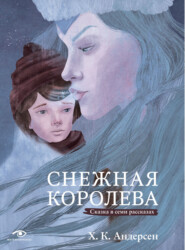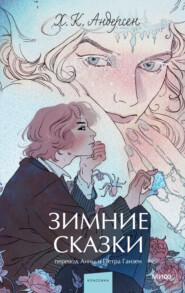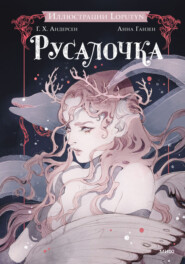По всем вопросам обращайтесь на: info@litportal.ru
(©) 2003-2024.
✖
Wonderful Stories for Children
Настройки чтения
Размер шрифта
Высота строк
Поля
"Yes, we were then on the green branch," said they; "then we were really and truly on a green branch; every morning and evening we drank diamond tea, that was the dew; every day we had sunshine, if the sun shone, and all the little birds told us tales. We could very well observe also, that we were rich; for the common trees were only dressed in summer, but our family had a good stock of green clothing both winter and summer. But then came the wood-cutters – that was a great revolution, and our family was cut up root and branch; the main head of the family, he took a place as mainmast in a magnificent ship, which sailed round the world wherever it would; the other branches, some took one place, and some took another; and we have now the post of giving light to the common herd; and, therefore, high-born as we are, are we now in the kitchen."
"Yes, it was different with me," said the iron pot, when the matches were silent; "as soon as ever I came into the world I was cleaned and boiled many a time! I care for the solid, and am properly spoken of as first in the house. My only pleasure is, as soon as dinner is over, to lie clean and bright upon the shelf, and head a long row of comrades. If I except the water-bucket, which now and then goes down in the yard, we always live in-doors. Our only newsmonger is the coal-box; but it talks so violently about government and the people! – yes, lately there was an old pot, which, out of horror of it, fell down and broke to pieces!"
"Thou chatterest too much!" interrupted the tinder, and the steel struck the flint until sparks came out. "Should we not have a merry evening?"
"Yes; let us talk about who is the most well-bred among us," said the brimstone matches.
"No, I don't think it right to talk about ourselves," said an earthen jug; "let us have an evening's entertainment. I will begin; I will tell something which everybody has experienced; people can do that so seldom, and it is so pleasant. By the Baltic sea – "
"That is a beautiful beginning!" said all the talkers; "it will certainly be a history which we shall like."
"Yes, then I passed my youth in a quiet family; the furniture was of wood; the floors were scoured; they had clean curtains every fortnight."
"How interestingly you tell it!" said the dusting-brush; "one can immediately tell that the narrator is a lady, such a thread of purity always runs through their relations."
"Yes, that one can feel!" said the water-bucket, and made a little skip of pleasure on the floor.
And the earthen jug continued her story, and the end of it was like the beginning.
All the talkers shook for pleasure; and the dusting-brush took green parsley leaves from the dust-heap, and crowned the jug; for he knew that it would vex the others; and thinks he to himself, "If I crown her to-day, she will crown me to-morrow!"
"Now we will dance," said the fire-tongs; and began dancing. Yes, indeed! and it is wonderful how he set one leg before the other; the old shoehorn, which hung on a hook, jumped up to see it. "Perhaps I, too, may get crowned," said the fire-tongs; and it was crowned.
"They are only the rabble!" thought the brimstone matches.
The tea-urn was then asked to sing; but it said it had got a cold, and it could not sing unless it was boiling; but it was nothing but an excuse, because it did not like to sing, unless it stood upon the table, in grand company.
In the window there sat an old pen, which the servant-girl was accustomed to write with: there was nothing remarkable about it; it was dipped deep into the ink-stand. "If the tea-urn will not sing," said the pen, "then she can let it alone! Outside there hangs a nightingale in a cage, which can sing, and which has not regularly learned any thing; but we will not talk scandal this evening!"
"I think it highly unbecoming," said the tea-kettle, which was the kitchen singer, and half-sister to the tea-urn, "that such a foreign bird should be listened to! Is it patriotic? I will let the coal-box judge."
"It only vexes me," said the coal-box; "it vexes me so much, that no one can think! Is this a proper way to spend an evening? Would it not be much better to put the house to rights? Every one go to his place, and I will rule; that will produce a change!"
"Yes, let us do something out of the common way!" said all the things together.
At that very moment the door opened. It was the servant-girl, and so they all stood stock still; not a sound was heard; but there was not a pot among them that did not know what they might have done, and how genteel they were.
"If I might have had my way," thought they, "then it would have been a regularly merry evening!"
The servant-girl took the brimstone matches, and put fire to them. Bless us! how they sputtered and burst into a flame!
"Now every one can see," thought they, "that we take the first rank! What splendor we have! what brilliancy!" – and with that they were burnt out.
LITTLE IDA'S FLOWERS
"My poor flowers are quite dead," said little Ida. "They were so beautiful last evening, and now all their leaves hang withered. How can that be?" asked she from the student who sat on the sofa. She was very fond of him, for he knew the most beautiful tales, and could cut out such wonderful pictures; he could cut out hearts with little dancing ladies in them; flowers he could cut out, and castles with doors that would open. He was a very charming student.
"Why do the flowers look so miserably to-day?" again asked she, and showed him a whole bouquet of withered flowers.
"Dost thou not know what ails them?" said the student; "the flowers have been to a ball last night, and therefore they droop so."
"But flowers cannot dance," said little Ida.
"Yes, when it is dark, and we are all asleep, then they dance about merrily; nearly every night they have a ball!" said the student.
"Can no child go to the ball?" inquired Ida.
"Yes," said the student, "little tiny daisies and lilies of the valley."
"Where do the prettiest flowers dance?" asked little Ida.
"Hast thou not," said the student, "gone out of the city gate to the great castle where the king lives in summer, where there is a beautiful garden, with a great many flowers in it? Thou hast certainly seen the swans which come sailing to thee for little bits of bread. There is a regular ball, thou mayst believe!"
"I was in the garden yesterday with my mother," said Ida, "but all the leaves were off the trees, and there were hardly any flowers at all! Where are they? In summer I saw such a many."
"They are gone into the castle," said the student. "Thou seest, as soon as the king and all his court go away to the city, the flowers go directly out of the garden into the castle, and are very merry. Thou shouldst see them! The two most beautiful roses sit upon the throne, and are king and queen; all the red cockscombs place themselves on each side, and stand and bow, they are the chamberlains. Then all the prettiest flowers come, and so there is a great ball; the blue violets represent young midshipmen and cadets, they dance with hyacinths and crocuses, which they call young ladies. The tulips and the great yellow lilies, they are old ladies who look on, and see that the dancing goes on properly, and that every thing is beautiful."
"But is there nobody who gives the flowers any thing while they dance in the king's castle?" asked little Ida.
"There is nobody who rightly knows about it," said the student. "In the summer season at night the old castle-steward goes regularly through the castle; he has a great bunch of keys with him, but as soon as ever the flowers hear the jingling of his keys, they are quite still, hide themselves behind the long curtains, and peep out with their little heads. 'I can smell flowers somewhere about,' says the old castle-steward, 'but I cannot see them!'"
"That is charming!" said little Ida, and clapped her hands; "but could not I see the flowers?"
"Yes," said the student, "only remember the next time thou art there to peep in at the window, and then thou wilt see them. I did so one day; there lay a tall yellow Turk's-cap lily on a sofa; that was a court lady."
"And can the flowers in the botanic garden go out there? Can they come such a long way?" asked Ida.
"Yes, that thou mayst believe," said the student; "for if they like they can fly. Hast thou not seen the pretty butterflies, the red, and yellow, and white ones, they look almost like flowers, – and so they have been; they have grown on stalks high up in the air, and have shot out leaves as if they were small wings, and so they fly, and when they can support them well, then they have leave given them to fly about by day. That thou must have seen thyself! But it is very possible that the flowers in the botanic garden never have been into the king's castle, nor know how merry they are there at night. And now, therefore, I will tell thee something that will put the professor of botany who lives beside the garden into a perplexity. Thou knowest him, dost thou not? Next time thou goest into his garden, do thou tell one of the flowers that there will be a great ball at the castle; it will tell it to its neighbor, and it to the next, and so on till they all know, and then they will all fly away. Then the professor will come into the garden, and will not find a single flower, and he will not be able to imagine what can have become of them."
"But how can one flower tell another? flowers cannot talk," said little Ida.
"No, they cannot properly talk," replied the student, "and so they have pantomime. Hast not thou seen when it blows a little the flowers nod and move all their green leaves; that is just as intelligible as if they talked."
"Can the professor understand pantomime?" inquired Ida.
"Yes, that thou mayst believe! He came one morning down into his garden, and saw a tall yellow nettle pantomiming to a beautiful red carnation, and it was all the same as if it had said, 'Thou art so handsome, that I am very fond of thee!' The professor was not pleased with that, and struck the nettle upon its leaves, which are its fingers; but they stung him so, that from that time he has never meddled with a nettle again."
"That is delightful!" said little Ida, and laughed.
"Is that the stuff to fill a child's mind with!" exclaimed the tiresome chancellor, who was come in on a visit, and now sat on the sofa. He could not bear the student, and always grumbled when he saw him cutting out the beautiful and funny pictures, – now a man hanging on a gallows, with a heart in his hand, because he had stolen hearts; and now an old lady riding on a horse, with her husband sitting on her nose. The cross old chancellor could not bear any of these, and always said as he did now, "Is that the stuff to cram a child's head with! It is stupid fancy!"
But for all that, little Ida thought that what the student had told her about the flowers was so charming, that she could not help thinking of it. The flowers hung down their heads, because they had been at the ball, and were quite worn out. So she took them away with her, to her other playthings, which lay upon a pretty little table, the drawers of which were all full of her fine things. In the doll's bed lay her doll, Sophie, asleep; but for all that little Ida said to her, "Thou must actually get up, Sophie, and be thankful to lie in the drawer to-night, for the poor flowers are ill, and so they must lie in thy bed, and, perhaps, they will then get well."
With this she took up the doll, but it looked so cross, and did not say a single word; for it was angry that it must be turned out of its bed.
So Ida laid the flowers in the doll's bed, tucked them in very nicely, and said, that now they must lie quite still, and she would go and get tea ready for them, and they should get quite well again by to-morrow morning; and then she drew the little curtains close round the bed, that the sun might not blind them.
All the evening long she could not help thinking about what the student had told her; and then when she went to bed herself, she drew back the curtains from the windows where her mother's beautiful flowers stood, both hyacinths and tulips, and she whispered quite softly to them, "I know that you will go to the ball to-night!" but the flowers looked as if they did not understand a word which she said, and did not move a leaf – but little Ida knew what she knew.

















